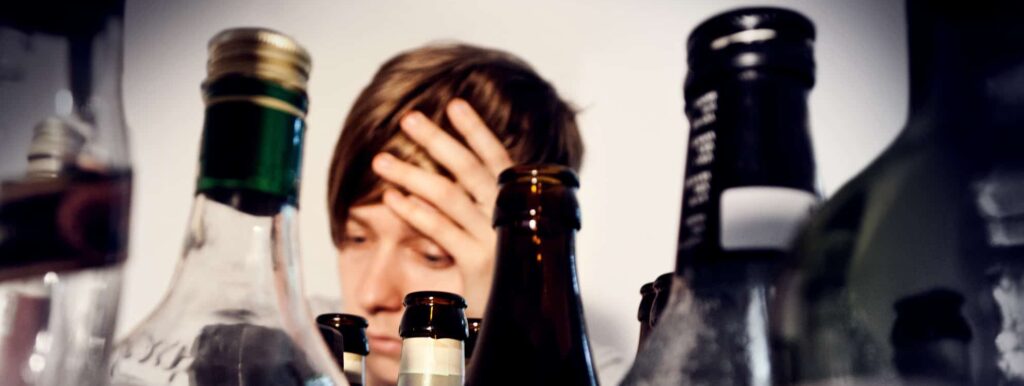Did you know that every year 3 million deaths are due to alcoholism around the globe? There are many symptoms of the harmful use of alcohol, but if you find yourself hiding alcohol, it may be a sign of a larger issue with your drinking.
Whether you’re hiding it from family members or friends, hiding alcohol can indicate an unhealthy relationship with alcohol that needs to be addressed.
Hiding alcohol is not only a symptom of problem drinking but can also lead to other issues such as depression and anxiety. It’s important to understand why hiding alcohol happens and how to get help if needed.
This article will discuss the signs of hiding alcohol and provide resources for seeking professional help.
What Is Secret Drinking?
Secret drinking is a term that refers to hidden or clandestine alcohol consumption. Those who engage in this type of behavior often make an effort to keep their drinking private, making it difficult for family and friends to detect.
Common signs of secret drinking include:
- Avoiding gatherings where alcohol is present
- Missing work days due to hangovers
- Increased financial spending
- Heightened anxiety and stress
Although secretive drinking is not considered a diagnosis, clinical intervention may be needed in order to develop positive behaviors surrounding the concept of moderation in alcohol consumption.
Is Hiding Alcohol a Sign of Addiction?
There is an ongoing debate about whether hiding alcohol is a sign of addiction or not. Some may argue that this indicates an individual is transitioning into unhealthy habits. On the other hand, others are inclined to think that it may be normal behavior in certain social settings.
For instance, teens or young adults might hide alcohol at family events where it’s otherwise strictly forbidden. Additionally, although individuals may not be actively abusing alcohol, they might conceal it in order to avoid being on the receiving end of criticism and judgment from those around them.
Overall, the conclusion regarding the motivations behind this act remains unclear, with multiple valid explanations for why a person may choose to conceal alcoholic beverages.
Why Would Someone Hide Alcohol?
Hiding alcohol can be a sign of problem drinking. People may hide their alcoholic beverages for a variety of reasons, such as:
- Feeling embarrassed or ashamed about their drinking behavior
- Wanting to keep their drinking habits private
- Trying to access alcohol that is not meant for them
- Attempting to conceal the evidence of a transgression
In all of these cases, hiding alcohol can have an impact on someone’s life if left unchecked. If an individual notices a loved one exhibiting signs of excessive and secretive drinking it may be time to talk with them about the consequences of these actions in order to help them get back on track.
What to Do If Your Spouse is Hiding Alcohol?
It can be incredibly distressing to learn that your spouse is hiding alcohol. If this is the case, it is important to take inventory of the situation and how you are feeling.
First, it is important to talk openly and honestly with your partner in a non-judgmental manner. Ask them why they have chosen to drink secretly and listen to their response. This can help inform the next steps in making a plan together.
Using qualified therapy or counseling is recommended for couples trying to address serious issues related to drinking. This allows both parties an opportunity to share their perspectives openly, create healthy boundaries and address any underlying issues that may need attention.
Reaching for support may also be a beneficial tool for navigating this delicate issue, such as:
- Family members
- Friends
- Online resources
Telltale Signs of Alcoholism
Alcoholism is an issue that affects many people and their families, but it can be difficult to recognize if someone you know has a problem.
Many demonstrate signs of excessive alcohol consumption, such as:
- Needing a drink to start the day
- Drinking alone
- Neglecting commitments and responsibilities frequently
- Having problems with interpersonal relationships
- Being prone to dangerous behavior and mood swings
- Becoming violent when drinking
- Lying about or hiding their drinking habits
- Not remembering conversations or events
- Increasing tolerance for higher amounts of alcohol over time
- Finding it increasingly difficult to cut back on the amount they drink
Recognizing these telltale signs is key to getting the right help if you or a loved one are affected by alcoholism.
Alcohol Treatment Centers
Apex Recovery is a renowned alcohol treatment center located in San Diego, California and Nashville, TN. It offers a holistic approach to treating alcoholism, by uniting various aspects of therapy, including:
- Group counseling
- Individual counseling
- Continued sobriety education
In addition, the center also provides:
- Detoxification services
- Relapse prevention plans
- Aftercare programs
Apex Recovery emphasizes maximizing patients’ chances for successful recovery by utilizing evidence-based addiction treatments such as cognitive behavior therapy and contingency management.
The experienced staff at the facility is committed to helping those struggling with alcohol dependency create a foundation of sobriety. Apex Recovery offers tailored treatment programs and supportive care that empower clients to achieve their goals in an atmosphere of dignity and respect.
San Diego Alcohol Rehabilitation: Get Help Today
Hiding alcohol can be a sign of an underlying issue with drinking that needs to be addressed. It is important to recognize the signs, talk openly and honestly about it, and reach out for support from family members or friends if needed.
If you or someone you know may need help overcoming alcoholism in San Diego or Nashville, please don’t hesitate to contact Apex Recovery for treatment programs tailored specifically to your situation.
Our experienced staff is here to provide comprehensive care and support services so that you can take back control of your life and achieve sobriety. Get help today!

